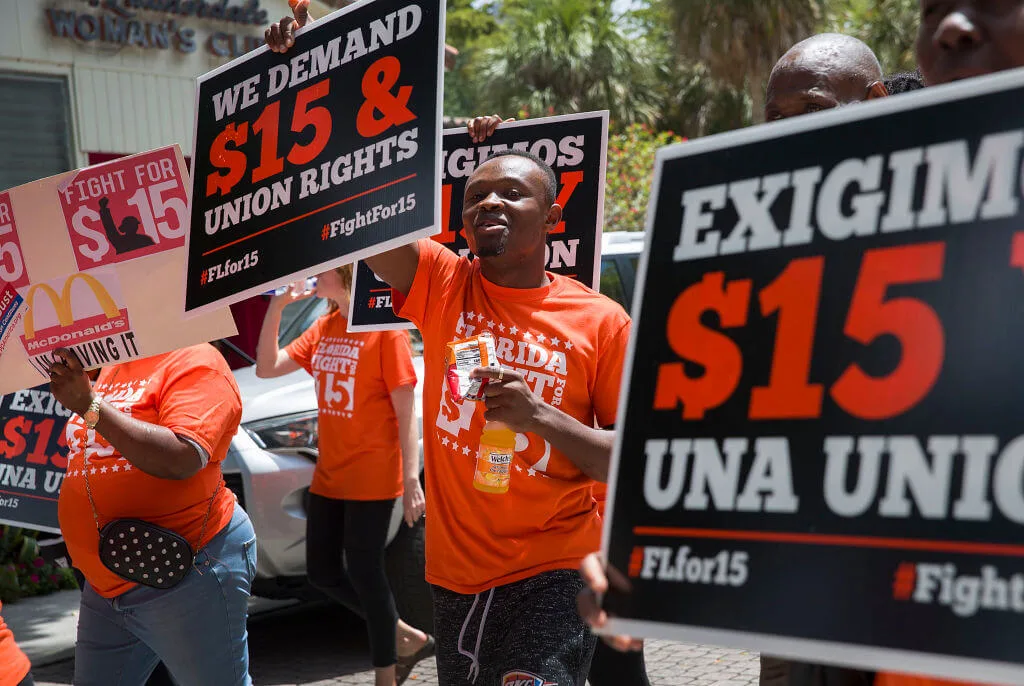
People gather together to ask the McDonald’s corporation to raise workers wages to a $15 minimum wage as well as demanding the right to a union on May 23, 2019 in Fort Lauderdale, Florida. The nation wide protest at McDonald’s was held on the day of the company’s shareholder meeting. (Photo by Joe Raedle/Getty Images)
Voters in states like Florida, Montana, and South Dakota backed policies increasing the minimum wage or legalizing drugs.
Voters in red states may have elected Republican representatives, but they also backed progressive policies that their chosen candidates often oppose.
The most fascinating example can be found in Florida. The Sunshine State voted in favor of increasing the minimum wage to $15 by 2026, despite voting for President Donald Trump and other Republican candidates who have been adamantly opposed to raising the wage for working-class people. It is the eighth state to vote in favor of raising the minimum wage to $15.
Legalizing drugs also won on Election Night. Despite Trump’s notoriously draconian stance on drugs and his musing about a death penalty for drug-related offenses, red states voted in favor of decriminalization and recreational legalization. For example, Mississippi voted in favor of legalizing medical marijuana, while Montana, South Dakota, and Arizona–which has historically voted Republican until this year–voted to legalize recreational marijuana.
Colorado, which recently ousted Republican Sen. Cory Gardner, voted against a radical anti-abortion measure. The ballot initiative would have banned abortions after 22 weeks but was opposed by 60% of voters. It called for the abortion ban even in cases of rape, incest, or for the health of the mother. The only case permitted was “when the abortion is immediately required to save the life of the pregnant woman when her life is physically threatened.” It also would have fined and suspended medical licenses of doctors if they performed an abortion past 22 weeks of the pregnancy.
There were 38 statewide ballots measures at stake on Election Night. Ballot measures let states circumvent lawmakers, and pass and implement laws directly by voters instead. Although the pandemic caused 2020 to see the lowest number of ballot measures since 1980, several states—some of which are notoriously conservative—placed progressive initiatives on the ballot this year.
This is a significant outcome of the election year, considering that, depending on state laws, measures get on the ballot in one of two ways: State legislatures put issues on the ballot when they decline to vote on it themselves or when citizens collect enough signatures to put their issues up for votes. The coronavirus pandemic and several statewide quarantine lockdowns prevented political coalitions from collecting signatures to put their initiatives on the ballot. Nevertheless, the general election still resulted in a favorable outcome for progressive policies.
Another indication of a favorable shift towards progressive laws can be seen in states where Democrats won in districts known to be Republican strongholds. Rep. Katie Porter won her re-election against Republican challenger Greg Raths in California’s 45th Congressional District. Home to conservative Orange County, it was considered to be an easy victory for Raths. But after initially flipping the district blue in the 2018 midterm elections, Porter gained prominence on Capitol Hill for championing progressive causes—from scrutinizing Wall Street bankers and the Trump administration to pushing for Medicare for All and gun control.
In addition to Porter’s victory, there were several historic wins among progressive candidates who identified as either LGBTQ, Indigenous, immigrant, Muslim, and/or a person of color. One example is Taylor Small, who became the first openly transgender person elected to the state legislature in Vermont, where voters just elected a Republican governor. The 26-year-old won her seat in the state house by championing progressive issues, including a single-payer healthcare model, throughout her campaign.
Rep. Ilhan Omar, who became one of the first Muslim woman elected into Congress in 2018, won her re-election in Minnesota—one of the competitive states in this election—after surviving an Islamophobic smear campaign from Trump and his Republican colleagues. Omar, one of four members in “The Squad”—a group of progressive congresswomen of color—is also known for her progressive policy stances, including Medicare For All, a Green New Deal, a $15 minimum wage, and a ban on fracking.
“We are building a movement that sees my struggle as inherently tied to your struggle, and sees a world where all workers can be uplifted,” Omar said in a tweet after winning her re-election. “Together. Today’s vote – the results of this election – are not the end. This is just the beginning.”
Politics

Democrats clear path to bring proposed repeal of Arizona’s near-total abortion ban to a vote
Democrats in the Arizona Senate cleared a path to bring a proposed repeal of the state's near-total ban on abortions to a vote after the state's...

It’s official: Your boss has to give you time off to recover from childbirth or get an abortion
Originally published by The 19th In what could be a groundbreaking shift in American workplaces, most employees across the country will now have...
Local News

Kari Lake calls on Arizona county sheriffs to enforce 1864 abortion ban
Republican candidate for US Senate Kari Lake on Saturday seemed to solidify her support for Arizona’s total abortion ban and called on county...

Where to buy farm-fresh eggs in Tucson
Once you’ve tasted farm-fresh eggs, it’s hard to go back to the store-bought variety. Not only do farm-fresh eggs taste better and have...




